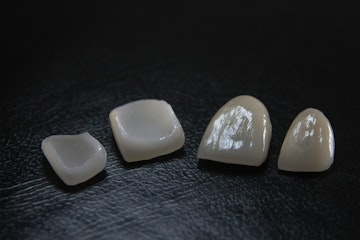
The Pros And Cons of Dental Veneers — Are They Worth It?
Curious about dental veneers? This common cosmetic procedure is growing in popularity thanks to increased accessibility and a boost in visibility thanks to celebrities and influencers. While veneers were once thought to be something that only the Hollywood elite would consider, they are now available for a much more affordable price, and most dentists offer this treatment.
Veneers help to address a wide range of aesthetic concerns, from discolouration to crooked teeth. The main appeal of veneers is that they can provide an instantaneous makeover, addressing multiple issues at once and removing the need for multiple cosmetic treatments.
However, veneers are not without their downsides. Before undergoing any significant cosmetic treatment, it’s vital for patients to be informed about the potential downsides. With veneers, the main disadvantage is that your natural teeth will have to be prepared to make space for the veneer. This means you’ll have to wear a veneer for the rest of your life, which means you may need to replace or repair it in the future.
If you’re thinking about veneers to improve your smile, read on to learn more about the pros and cons of this treatment. This can help you to decide if the treatment is worth considering, or if an alternative treatment might be more suitable.

What are the pros of veneers?
Veneers, which are thin shells of porcelain or composite resin bonded to the front surface of teeth, offer several benefits:
Veneers can dramatically improve the appearance of teeth by covering up stains, discoloration, chips, cracks, and even minor misalignments. They provide a natural-looking, bright, and symmetrical smile.
Unlike some dental procedures that require significant removal of tooth structure, veneers typically require minimal alteration of the natural tooth enamel. This preserves more of the tooth's structure compared to procedures like crowns.
Veneers are resilient and can withstand normal biting forces. With proper care, they can last for many years, providing a long-term solution for cosmetic dental concerns.
Porcelain veneers are highly resistant to stains from coffee, tea, wine, and other common staining agents. This means that your smile can stay bright and white for an extended period.
Compared to orthodontic treatments or other dental procedures, veneers can produce significant cosmetic improvements in a relatively short amount of time. Depending on the situation, the entire process from consultation to placement can be completed in a few appointments.
Veneers are easy to maintain with regular brushing, flossing, and dental check-ups. There are no special maintenance requirements beyond standard oral hygiene practices.

What are the cons of veneers?
This procedure might sound tempting, but it’s important to consider the downsides before moving forward with treatment.
The process of placing veneers involves removing a thin layer of enamel from the front surface of the teeth, which is irreversible. Once enamel is removed, the teeth will always require some form of restoration.
Some individuals may experience increased tooth sensitivity following the placement of veneers, especially if a significant amount of enamel is removed during the preparation process.
Veneers can be expensive, especially porcelain veneers, which tend to be more durable and natural-looking compared to composite resin veneers. The cost can vary depending on factors such as the materials used, the dentist's expertise, and geographic location.
Veneers are primarily cosmetic solutions and may not be suitable for addressing significant dental problems such as advanced decay, extensive damage, or severe misalignment. In such cases, more extensive treatments may be necessary.
While veneers are durable, they can still be damaged by excessive force, such as teeth grinding or biting on hard objects. If not properly maintained, veneers may chip or come loose over time, requiring repair or replacement.
Closing thoughts
It's essential to consult with a qualified dentist to determine whether veneers are the right option for your specific dental needs and goals. When you book a consultation, make sure you prepare questions to help clear up any concerns you might have about veneers.
You should also explore the alternative treatment options before deciding if veneers are right for you, as there could be other treatments available that are better suited to your goals and requirements.

Call us to make your appointment
Interest-free credit available
Worried about the cost of treatment? We offer financing plans to allow you to spread the cost.